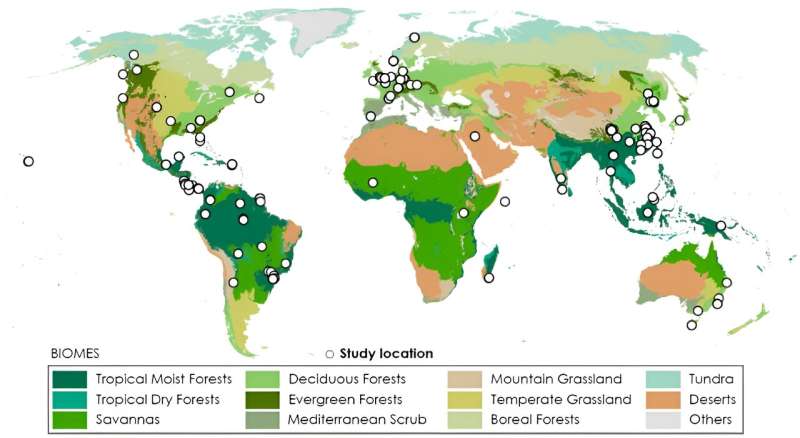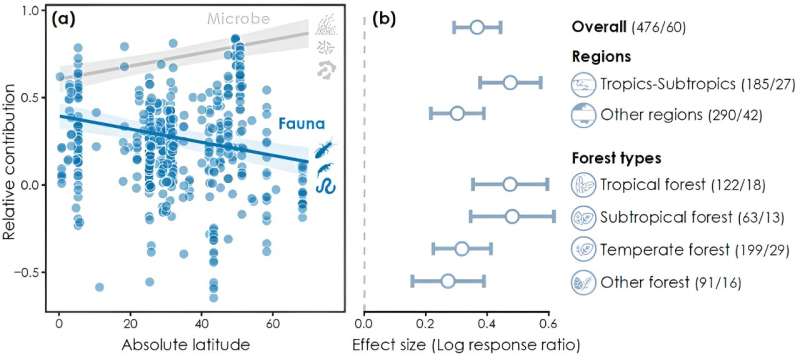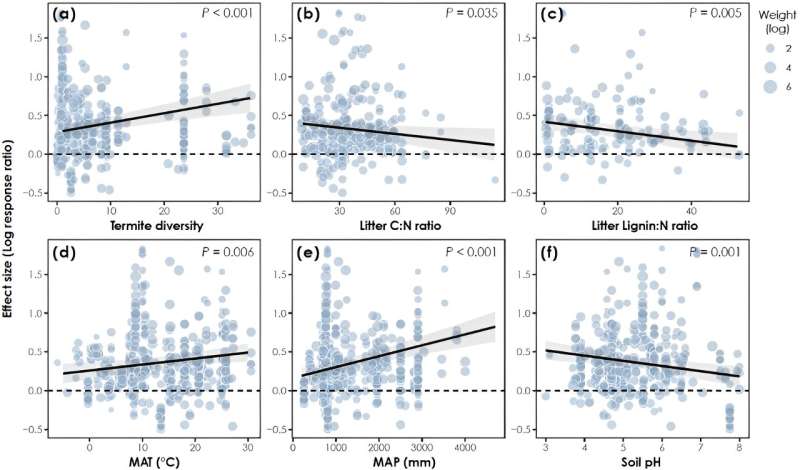Global distribution of forest leaf litter decomposition experiment used in this study. Credit: Ecology Letters (2024). DOI: 10.1111/ele.14423
The University of Hong Kong (HKU) has studied the role of invertebrates in forest litter decomposition. The study, led by researchers Ph.D. candidate Xiaoyi Zeng and Professor Louise A. Ashton from the School of Biological Sciences at HKU, illustrates the significant contribution of soil invertebrates, specifically termites, to forest litter decomposition in tropical and subtropical regions.
The study was recently published in Ecology Letters, and the results are imperative for preserving healthy ecosystems and conserving invertebrates in the wake of widespread environmental change.
Litter decomposition is a crucial process in carbon cycling and nutrient turnover. Microbes, such as bacteria and fungi, are widely considered the most important decomposers in nature. However, soil invertebrates contribute a large proportion of decomposing and nutrient turnover and are therefore important for functioning and healthy ecosystems.
Most previous studies on decomposition and nutrient turnover are conducted in temperate regions like Europe and North America, resulting in a biased perspectives and substantial knowledge gaps regarding the roles of invertebrates in global ecosystem processes.
A major invertebrate decomposer in the tropics are termites, which is often viewed only as pests to humans. However, termites are important ecological engineers in the tropics, helping to break down organic matter and redistribute nutrients. Termite dominance in the tropics, as opposed to temperate regions, should result in differences across regions regarding invertebrate decomposition, but this has not been well established.
Soil invertebrate contributions to forest litter decomposition across regions. (a) Relative contributions of invertebrates (blue) and microorganisms (grey) to forest litter decomposition against absolute latitude. (b) Effect sizes of invertebrates on forest litter decomposition at global, regional, and biome scales. Credit: Ecology Letters (2024). DOI: 10.1111/ele.14423
In this study, the HKU research team included 476 case studies from 93 sites across the globe. A meta-analysis approach was used to assess the regional differences in forest litter decomposition mediated by invertebrates.
The results showed that invertebrates contributed 31% to global forest litter decomposition, and the contribution of soil invertebrates in tropical and subtropical forests was 1.4 times higher than that in temperate and boreal forests. Termites, together with warm and humid climate contributed to the greater decomposition in tropical and subtropical forests.
This study highlights the global importance of invertebrates in driving the decomposition of forest litter, particularly in tropical and subtropical regions. However, the contribution of invertebrates to forest litter decomposition may be underestimated due to the current regional sampling bias.
Additionally, this study highlights the importance of termites in nutrient cycling. Many still consider termites as crop pests and widely use insecticides to reduce termite abundance. Conservation of invertebrates in tropical and subtropical regions is crucial for maintaining ecosystem services, given the widespread environmental change in these areas.
Influence of (a) termite diversity, (b) litter C: N ratio, (c) litter lignin: N ratio, (d) mean annual temperature (MAT), (e) mean annual precipitation (MAP), and (f) soil pH on invertebrate effect sizes determined using mixed-effect meta regressions. Credit: Ecology Letters (2024). DOI: 10.1111/ele.14423
Therefore, this study stresses the need to integrate invertebrate functions into earth system models as they contribute approximately 31% of global forest litter decomposition. An extensive and standardized data collection is of great value to develop global database of soil biodiversity and improve the predictive power of earth system models.
Furthermore, forest management approaches that focus on insecticide use to control termite populations may have unintended consequences on ecosystem functioning (e.g., nutrient cycling). Instead, forest managers should consider conservation strategies that protect invertebrate populations and promote sustainable forest management practices.
"This study shows that invertebrates are essential for decomposition, keeping ecosystems working by breaking down dead organic material. Invertebrates like termites are particularly important in the tropics and sub-tropics where most biodiversity occurs.
"Invertebrate biodiversity is threatened by human activities such as climate change, habitat loss and pollution. It is essential we mitigate biodiversity loss in order to maintain healthy, functioning ecosystems into the future," said Professor Louise Ashton, Assistant Professor of HKU School of Biological Sciences.
More information: Xiaoyi Zeng et al, Global contribution of invertebrates to forest litter decomposition, Ecology Letters (2024). DOI: 10.1111/ele.14423
Provided by The University of Hong Kong


























